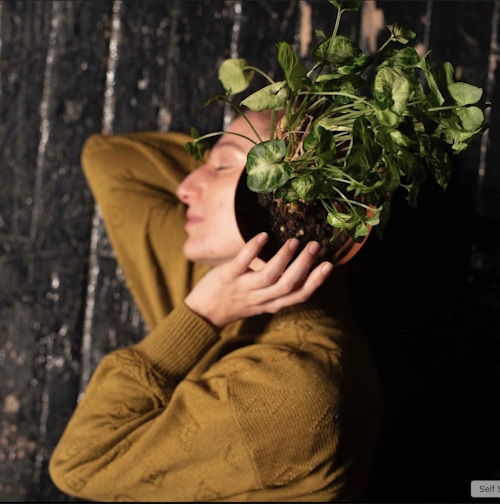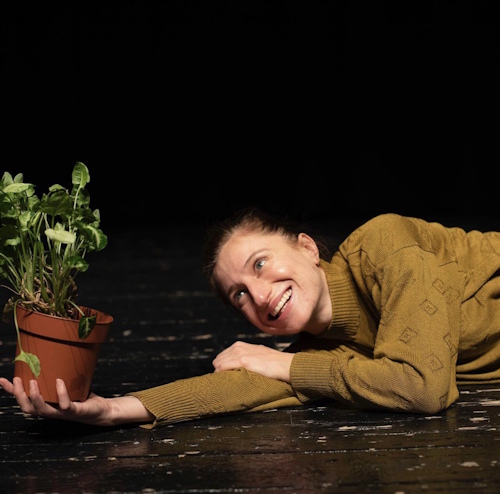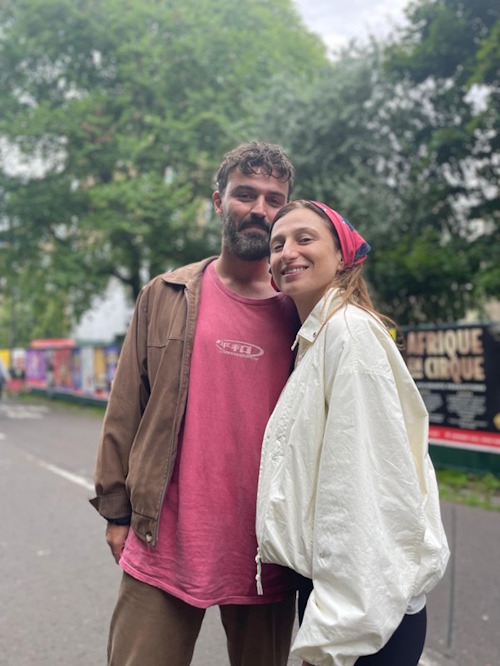'Here to Make a Mess': Transnational Conversations with Theatre-makers #2
Published: 17 December 2024
Dirmit: In Conversation with Nezaket Erden, by Erdem Avşar
By Erdem Avşar
Since Here to Make a Mess, a collection of video performances I commissioned from a group of international theatre-makers, opened at UNESCO RIELA’s Spring School 24, I have been having conversations with performers, writers, translators and dramaturges about pretty much anything and everything: writing, the state of the world, migration, transnationality, languages – the list goes on. Not wanting to keep those conversations to myself, thanks to Bella Hoogeveen, they will now be published periodically here at UNESCO RIELA’s blog.
Here to Make a Mess #2:
Dirmit: In Conversation with Nezaket Erden
The second conversation is with Turkish theatre-maker Nezaket Erden. This one is a throwback to August 2024 and Fringe. Turkish theatre-maker and performer Nezaket Erden and director Hakan Emre Ünal brought their brilliant solo performance Dirmit, adapted from Latife Tekin’s novel Dear Shameless Death, to Fringe and I had the chance to ask them how they were finding it.

Nezaket Erden as Dirmit (photo by Çağla Uçak)
Dirmit has been talked about in Turkey for years; it has its own following. You’ve obviously done many interviews with your team. But, this is not really an interview and I’d rather focus more on Dirmit and Edinburgh. How did you decide to bring Dirmit to the Fringe?
Thank you. Yes, as you said, over the years we’ve reached a very large audience in Turkey and had incredible encounters of all sorts. We’ve performed in villages, alternative stages, and some of the biggest venues in the country. Over the years, we’ve also performed the play in different cities in Germany, London, and the Netherlands. Seeing that we could connect with people from various cultures through our play, and realizing that Dear Shameless Death—and consequently, the play Dirmit—is universal, we started dreaming about taking it to the Fringe. There are people here from all over the world—not just audiences but also creators, writers, and directors from many different cultures. We are thinking about how we can connect with them through the play and expand its reach even further.
As part of the UNESCO RIELA team and as artists, we often think about building intercultural and transnational relationships and how those relationships could be part of a meaningful and sustainable ecology. The play has just premiered in Scotland, I know, but what are your initial impressions so far?
So far, we’ve performed five shows. There are six more to go. While the venue we’re performing in suits the spirit of the play, technically, it’s not ideal—especially for the audience to follow the surtitles. The first two days were spent trying to solve these practical issues. As you know, performances are scheduled back-to-back, and we have only ten minutes after the previous play to set up for ours. We spend that time rearranging the seating and figuring out how to make it easier for the audience to follow the surtitles. Aside from these technical problems, the audience has generally been a mixed group—half who speak Turkish and half who don’t. Since I’m used to performing in larger venues for predominantly Turkish audiences, my relationship with the audience has naturally been very different here. But this relationship is also very strong, and I’m getting more used to it each day.
I’m curious about the audience’s reactions too. How does it feel to perform with surtitles, for example? I saw a tweet from a Scottish critic who called Dirmit ‘a story that needs to be told’—I came across it by chance, and I was delighted! How do you feel about the story’s urgency being recognised here as well?
Latife Tekin’s book has been translated into many languages and has garnered attention worldwide. Most recently, it was even featured in The Guardian’s selection. So, we already knew that the story was universal because of the interest the book had received. However, performing a play with surtitles—especially one so reliant on language—worried us. These concerns only increased because of the technical challenges I mentioned earlier. But with every performance, we discover and learn something new. We adjust the surtitles and explore how to adapt some moments—removing certain parts or translating the more verbal sections into movements and physical expressions. The sixth show we’ll perform tomorrow is vastly different from the first one we performed here. Revisiting and reworking a play we’ve been performing for so long has been a rewarding process in its own way.
So far, we’ve observed that people born and raised in Scotland or England find the story dark and quite impactful. Meanwhile, individuals of Nigerian, Serbian, Italian, or Japanese descent living here—those who resonate with the folk elements in the story—experience the sorrow and humour almost as audiences from Turkey would. The audience is very diverse, and since I perform by looking directly into their eyes, I can feel all their reactions simultaneously. This new way of connecting with the audience is something I’m learning here. But the most touching moment so far was hugging and crying with a Nigerian woman. Even with all the challenges, moments like that make this journey feel worthwhile.

Nezaket Erden as Dirmit (photo by Çağla Uçak)
Is this your first time in Edinburgh, then? Apart from Dirmit, how are you finding the city? The Fringe can be quite challenging indeed — particularly with its budget demands and the difficulty of finding an audience. What are some of the things that you find exciting? And maybe other practical things that you find a little bit challenging?
This is our first time in Edinburgh. The city is beautiful, like something out of a fairy tale. The Fringe atmosphere is also very vibrant, but we haven’t had much chance to enjoy it yet. I’d say we’re mostly enduring its difficulties. It’s very expensive here, especially during the festival—rents, for instance, go up. Personally, working to condense the play into 60 minutes and continually refining it has taken a lot of time. I’ve been handing out flyers and inviting people to our shows. We watch other performances whenever we can. Finding an audience for your play is very difficult here. Everywhere you turn, there’s a show. Some plays are performed for just one person; others don’t get any audience at all. Everyone is handing out flyers in the streets! At first, we were a bit shy about this, but we’ve opened up now. We’re trying to connect with people and tell them about the play. We also realized how little we knew about marketing and became acutely aware of our shortcomings. But we’ve found a lot of inspiration here.
Emre has been volunteering at the venue where we’re performing for the past three weeks. His experience has been completely different—it feels like we’ve gone back to our university theatre days, rebuilding everything from scratch in a new language and culture.
Dirmit has been performed in small venues, outdoors, and now at C Venues. Nezaket, as an actor, how do you adapt to different spaces? And as tradition dictates, I MUST ask: what are your future plans? I’m especially curious about potential international plans. Do you think you’ll return to Edinburgh?
Since Dirmit began, I’ve performed in such a variety of venues and conditions that I’ve developed significant experience in adapting to any situation. I try to embrace the venue’s advantages and disadvantages and build my performance accordingly. Emre, as a director, is especially good at identifying aspects of a space that help me mentally and emotionally adapt to it. For example, the stage we’re performing on now truly feels like the single-room house Dirmit lived in.
Just before coming here, I performed for over 2,000 people in an open-air venue in Izmir and 4,000 people in Harbiye. The transition was, of course, stark, but I adapted quickly. As Emre said, ‘It feels like I’ve gone back to where I started’ but my sister Emine told me, ‘No, you haven’t gone back. Dirmit is embarking on a brand-new journey. You’re just at the beginning of this new path.’ That perspective really helped me. We might not fully understand everything about this experience until it’s complete, but we definitely want to return here—under different circumstances and with all the knowledge we’ve gained.
We’ve dreamed of bringing [our other play] What’s Going to Happen to Yusuf Umut? here, as it fits the spirit of Fringe perfectly. Another dream of mine, which I’m not sure will happen but which I don’t want to leave untried, is performing Dirmit in English. Maybe next year. I want to remove the barrier of surtitles entirely. We also hope to return with a venue that understands our potential and gives our play the value it deserves, along with better promotion and conditions. As my sister said, ‘We’re just at the beginning of this new path...’

Nezaket Erden (right) and Hakan Emre Ünal in Edinburgh
About the author
Erdem Avşar is a playwright, poet, researcher, and translator. He is an affiliate artist at UNESCO RIELA. He is also a PhD researcher at the University of Glasgow researching queer politics of theatremaking in Turkey. His plays have been shown in Scotland and Italy. He was the 2019 recipient of the Kevin Elyot Award (University of Bristol Theatre Collection). He was also one of the four winners of the 2017 EU Collective Plays! International Playwriting Competition. His work has recently appeared in clavmag, Lune Journal, in the anthology The Book of Bad Betties (Bad Betty Press), and in Collaborative Playwriting (Routledge).
First published: 17 December 2024

